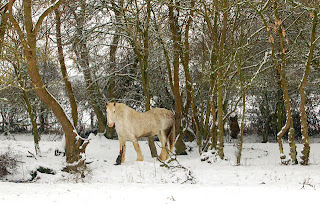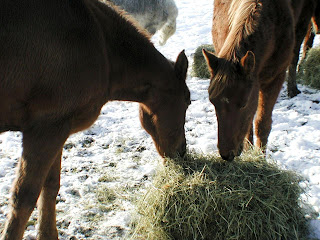 |
| Here's hoping for horsey white christmas! |
We're getting ready for the holidays here at Tic Tac Equestrian! Now, Christmas day is what you make it, but for us it’s a time to
get fat and enjoy yourself - but don’t forget about your horses! They deserve a
treat too and we’ve searched far and wide among horse lovers to get some great
ideas for special ways to treat your four-legged friends at this wonderful time
of the year.
Christmas Cake for
Horses
Who doesn’t love Christmas cake? Exactly – no one! And that
goes for our equine neighbours too. There are lots of different ways to spruce
up their Christmas feed, so let’s start off with a simple but irresistible
festive and wonderfully horsey Christmas cake.
Ingredients
Dark brown sugar - 500 g
1 Mug of bran
2 Mugs of chaff
1 apple
1 big carrot grated
1 small tin of black treacle
(You can add a mug of mix if you feed it)
Instructions
Heat up the sugar and treacle until melted, then stir in the
rest of the ingredients -you may need to add little more chaff or bran so it is
very thick.
Put into a medium-sized container and leave to set.
This recipe is very rich and sugary so be sure to feed with
care to horses with sugar intolerance or if you like, you can reduce the amount
of sugar you put in and replace with fruit - but it’s safe to say most healthy
horses love this!
Other treats
You can also use many of the same ingredients to make
different variations of fun, delicious horses treats, including these similar,
candy-style treats.
To make, simply mix 1 can of black treacle, 500g of dark
brown sugar, melt in a pan and pour into little lickit containers to make fun
tongue twisters – lots of brown sticky noses but they adore them.
Big Horse Treats
For bigger horses looking for a heartier wee feed, slices of
apple and long strips of carrot dipped into slices of toffee are also a great
Christmas day treat. You can also mix in chaff and leave to set in balls - very
messy to make but worth it.
Ingredients for the Toffee
200g sugar
55ml of water
15 g of butter
1 tablespoon of Golden Syrup
TO MAKE
Heat the sugar and water together until fully melted, add
butter and syrup and boil until 290 on jam thermometer or till it reaches the
soft crack stage.
Dip your carrot and apple or other fruit/veg of choice into
this and put on baking parchment until hard – and yes, the apple treats can be nice
for humans too, so don’t be afraid to give them a taste test!
Christmas Pudding
For an alternative Christmas Pudding recipe, here’s a quick
and easy way to keep your horses happy this winter:
Ingredients
Round bread roll
Golden syrup or molasses (optional)
Carrots
Apples
Pears (optional)
Polos
To Make
1. First cut a hole in your roll as if you are cutting the
stem out of the strawberry.
2. Keep the top part of the bread safe! You will need it
later!
3. Cut your carrots, apples and pears into thin sticks.
4. Arrange your sticks in the roll with at least three
pointing up, out of the bowl.
5. Place a polo on each stick pointing up.
6. Pour golden syrup in to help it stay together. (optional)
7. Place the "lid" of bread on top.
8. Put a splodge of golden syrup on top. (optional)
9. In the splodge put some pear and polos in the shape of
mistletoe on top. (optional)
10. Either put in feed or feed by hand!
REMEMBER: Only
feed these treats a little at a time as they are very rich and full of sugar.
But even a tiny taste will be a nice touch to help your horses and ponies enjoy
this holiday season! Also, if you’re feeling extra merry, a nice big splash of
Guinness in their Christmas dinner always goes down a treat too!
You can make fun variations of these recipes, or if you
like, please feel free to send us any of your own ideas and recipes, we’d love
to hear from you!
Hope you have a Merry Christmas and a Horsey New Year!!


